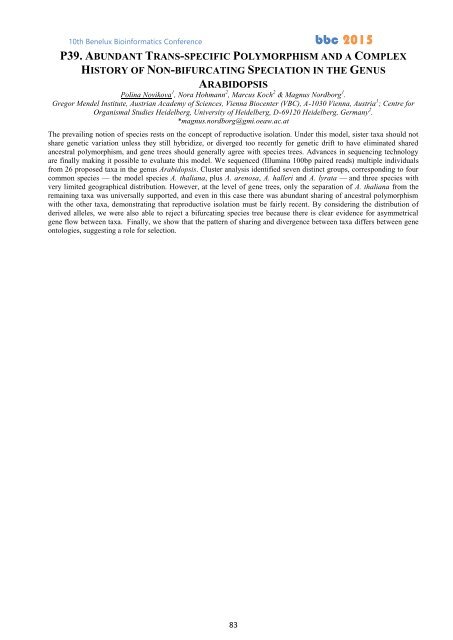bbc 2015
BBC2015_booklet
BBC2015_booklet
You also want an ePaper? Increase the reach of your titles
YUMPU automatically turns print PDFs into web optimized ePapers that Google loves.
BeNeLux Bioinformatics Conference – Antwerp, December 7-8 <strong>2015</strong><br />
Abstract ID: P<br />
Poster<br />
10th Benelux Bioinformatics Conference <strong>bbc</strong> <strong>2015</strong><br />
P39. ABUNDANT TRANS-SPECIFIC POLYMORPHISM AND A COMPLEX<br />
HISTORY OF NON-BIFURCATING SPECIATION IN THE GENUS<br />
ARABIDOPSIS<br />
Polina Novikova 1 , Nora Hohmann 2 , Marcus Koch 2 & Magnus Nordborg 1 .<br />
Gregor Mendel Institute, Austrian Academy of Sciences, Vienna Biocenter (VBC), A-1030 Vienna, Austria 1 ; Centre for<br />
Organismal Studies Heidelberg, University of Heidelberg, D-69120 Heidelberg, Germany 2 .<br />
*magnus.nordborg@gmi.oeaw.ac.at<br />
The prevailing notion of species rests on the concept of reproductive isolation. Under this model, sister taxa should not<br />
share genetic variation unless they still hybridize, or diverged too recently for genetic drift to have eliminated shared<br />
ancestral polymorphism, and gene trees should generally agree with species trees. Advances in sequencing technology<br />
are finally making it possible to evaluate this model. We sequenced (Illumina 100bp paired reads) multiple individuals<br />
from 26 proposed taxa in the genus Arabidopsis. Cluster analysis identified seven distinct groups, corresponding to four<br />
common species — the model species A. thaliana, plus A. arenosa, A. halleri and A. lyrata — and three species with<br />
very limited geographical distribution. However, at the level of gene trees, only the separation of A. thaliana from the<br />
remaining taxa was universally supported, and even in this case there was abundant sharing of ancestral polymorphism<br />
with the other taxa, demonstrating that reproductive isolation must be fairly recent. By considering the distribution of<br />
derived alleles, we were also able to reject a bifurcating species tree because there is clear evidence for asymmetrical<br />
gene flow between taxa. Finally, we show that the pattern of sharing and divergence between taxa differs between gene<br />
ontologies, suggesting a role for selection.<br />
83


